
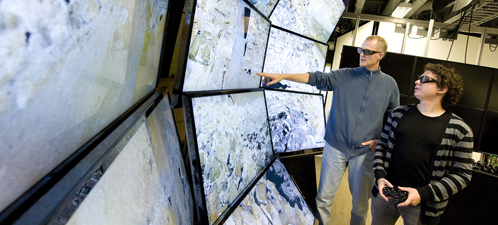

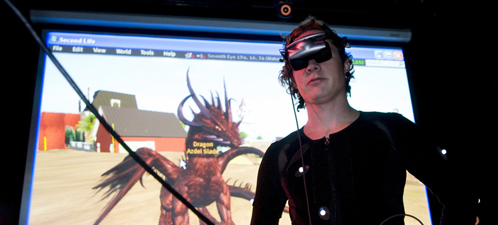
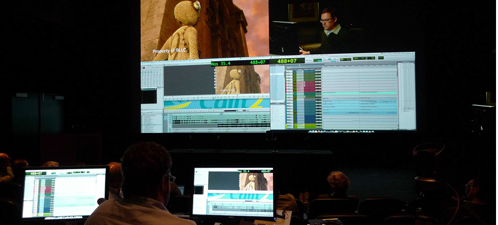
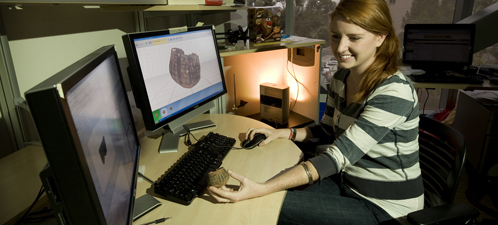
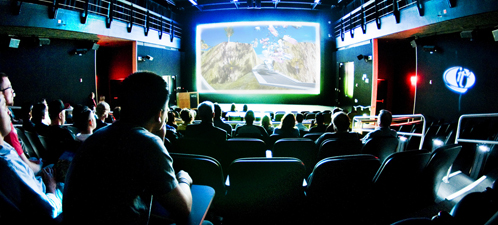
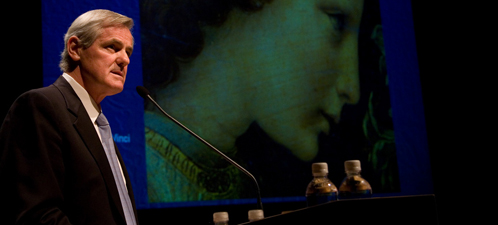
This is a draft alphabetical list of the campus academic partners Calit2 is working with to realize the institute's application vision in the realm of culture. The list contains centers, facilities, labs and large grants, but Calit2 also works closely with many individual faculty, schools and departments, as well as many private companies.
Calit2 Center for Graphics, Visualization and Virtual Reality (GRAVITY)
GRAVITY research interests include terascale scientific visualization and virtual reality, image-based modeling and rendering, as well as distributed and remote visualization. The GRAVITY team has been active in virtual-reality research for over a decade and the stringent VR requirements have served as important performance criteria for our large-scale distributed data analysis and visualization projects. Application areas include simulation-based design, rapid prototyping, computational fluid dynamics, command and control, and forensic analysis. Through a close collaboration with CISA3, GRAVITY research has created significant transformative impact and contributed to diagnostics and preservation of cultural heritage. http://gravity.calit2.net
UCI Center of Graphics, Visualization and Imaging Technology
The Center of GRAVITY is an interdisciplinary research facility focused on large-scale image display, distributed computing and parallel rendering. It was designed to provide the academic and research community with a facility to visualize high-resolution simulation, video and image data, and to enable researchers to communicate with other visualization facilities via high-speed networks, extending their research work outside their lab walls and into the physical world. Research areas include: Digital Image Acquisition, Digital Image Processing, Large-Area Tiled Displays, Multi-Projector Displays, Parallel Image Processing, Distributed Computing, Computer Graphics, Geometry and Topology, Scientific Visualization, Information Visualization, Visual Analytics, Medical and Biomedical Imaging, Earthquake Simulation, Earth System Science, Hardware and Software System Integration, Human Computer Interaction, and Virtual Reality. http://www.calit2.uci.edu/about-calit2/itemdetail.aspx?cguid=26f4ad41-9ac5-4026-a3e4-4d54a6242344
Center of Interdisciplinary Science for Art, Architecture and Archaeology (CISA3)
CISA3 was launched in February 2007 to play a leadership role in the use and development of tools and techniques to reconstruct and analyze the history of great works art, monumental structures as well as archaeological sites and artifacts. CISA3 operates at the intersection of world cultural heritage and science - seeking objective knowledge and a more factual basis for understanding art history and the creative genius of artists and civilizations. The center also explores methodologies and solutions to problems of art conservation, while training a new generation of interdisciplinary experts to work in this emerging field. At its core, CISA3 aims to change the way the world looks at its cultural heritage in two basic ways: using multispectral imaging and analytical tools to uncover the techniques, materials, state of conservation and history of the given works; and creating new methods for visualizing and interacting, both individually and in groups, with the findings of the center's field projects, in order to engage viewers more fully in the appreciation of works of art and antiquities. http://cisa3.calit2.net/
Center for Learning through the Arts and Technology
The Center for Learning through the Arts and Technology at UC Irvine brings together nationally renowned faculty and professional researchers from within and across disciplines to examine the reciprocal impact of the arts on learning and human well being, including the formulation of new public policy. Partners work collaboratively to define new - and amplify existing -- research efforts as well as to direct service programs and provide arts curriculum for educational institutions, thus broadening perspectives through unique projects and partnerships. http://www.clta.uci.edu
Center for Research in Computing and the Arts (CRCA)
CRCA is an organized research unit of UC San Diego that facilitates the creation of vanguard culture via computer science research. Areas of current activity include: next-generation digital media, multicore computing, experimental computer games, future cinema, networked multimedia, software studies, cultural visualization, science/art collaborations, virtual reality, and computer-spatialized audio. CRCA is also the home of the UCSD branch of the NSF-sponsored Center for Hybrid Multicore Productivity Research. As the University of California's oldest arts research center, CRCA pursues speculative cultural activities that draw upon humanistic analysis, engineering innovation and the insights of artistic expression. Faculty members devise new modes of artistic practice through their liaisons with international cultural institutions, technology industries and interdisciplinary collaborations. CRCA provides the framework for a broad range of approaches to artistic, scholarly and technological development that is at the basis of our digitally transformed culture. http://crca.ucsd.edu
Center for Research in Entertainment and Learning (CREL)
The purpose of CREL is to leverage the unique interdisciplinary nature of its members in promoting crossover art-science research on participatory media for education and entertainment, with a focus on grassroots creativity and learning. The rise of the Internet, web, digital media and social networking environments introduces new methods for the creation of educational and cultural content. These methods include ways to employ audience back-channeling, crowd-sourcing, artificial intelligence and distributed moderation techniques for engaging the public in meaningful interaction with artists and educators, and allow people to be more creative, informed and make better decisions in educational as well as entertainment environments. http://crel.calit2.net
Center for Research on Information Technology in Organizations (CRITO)
CRITO at UC Irvine is one of the world's leading think tanks on the impact of information technology (IT) on organizations and society, and on the management of information technology. The center has a rich tradition of studying the impacts of IT on organizations and society that stretches back more than two decades. It is home to well over a dozen internationally recognized experts in the fields of management, computer science, and social science, often bringing the advantages of multidisciplinary perspectives to the problems at hand. http://www.crito.uci.edu
Center for Research on Educational Equity, Assessment and Teaching Excellence (CREATE)
The CREATE approach enables the university to bring its most vital resources - faculty and students - to support local schools and school districts. Faculty members introduce the latest innovations in learning and test their effectiveness. UCSD students act as tutors, mentors and role models for K-12 students, providing a constant reminder that ethnic or economic circumstances are not an obstacle to receiving the best possible education. http://create.ucsd.edu/
Embodied Media and Performance Technology Lab (emptLab)
Through artistic inquiry and technology development, this lab at UC Irvine explores how environments augmented by computer and communications technology can support the performative act. The primary focus of emptLab research is to integrate expanded digital media art practices with dance, music and theatre performance. Its eMedia Studio in the Calit2 building is a 3000 sq. ft. "Distributed Arts Collaboratory" designed specifically for digital media and interactive arts. The eMedia Studio is a central site for the Virtual Venues initiative for telepresence and interactive digital media performance. Integrating high-definition audio and video, distributed computation, high-performance optical networks and interactive media environments, the Virtual Venues initiative is staging a series of exploratory performing arts events that occur at multiple locations simultaneously. http://embodied.uci.edu/
Immersive Visualization Laboratory (IVL)
The IVL features several new developments in virtual reality displays: the UCSD/Calit2 StarCAVE, taking the original CAVE conception to much higher resolution and contrast. Newer even is the NexCAVE, which is the first LCD micropolarized flat-panel virtual reality display and autostereo displays, the Varrier and the REVE. The IVL supports several software and application packages for advanced visualization and virtual reality. The IVL also hosts the CineGrid initiative to fully exploit and leverage UCSD/Calit2's state-of-the-art digital cinema installation. CineGrid has now attracted a worldwide membership of dozens of universities, companies, networks and non-profits (including the Academy of Motion Picture Arts and Sciences), and networks, and has held major conference and demonstration events at UCSD/Calit2. The CineGrid Exchange, a hundreds-of-terabytes globally distributed digital cinema archiving system, is currently in development and is being propagated to Chicago, Toronto, Amsterdam, Prague and Tokyo. The IVL is also the visualization center for the global virtual parallel OptIPuter that incorporates widely distributed processor clusters connected over dedicated networking circuits, and mass storage systems that serve as large distributed media and data repositories. In addition, IVL prototyped and globally propagated Calit2's infrastructure for very high-end visualization and virtual reality experiments in UCSD/Calit2's New Media Arts Wing, equipping the auditorium with the world's most advanced 4K digital cinema projector and hardware, software, and the 10 gigabit Ethernet networking and codecs to drive it. http://ivl.calit2.net/wiki/index.php/Main_Page
Institute for Money, Technology, and Financial Inclusion (IMTFI)
Established in 2008, the institute is housed in the School of Social Sciences at UC Irvine. Its mission is to support research on money and technology among the world's poorest people: those who live on less than $1 per day. IMTFI seeks to create a community of practice and inquiry into the everyday uses and meanings of money, as well as the technological infrastructures being developed as carriers of mainstream and alternative currencies worldwide. http://www.imtfi.uci.edu
Game Culture and Technology Lab
The mission of the Game Culture & Technology Lab at UC Irvine is to play with how game metaphors, design principles and technologies can be utilized for alternative content and context delivery. The focus is on the next-generation Internet and beyond. The approach combines theory and practice, art and science, education and entertainment, to create an environment that supports diverse forms of expression in a wide range of applications. The methods include sampling, misuse, hacking, appropriation, reverse engineering, and custom creation in the interest of open-source innovation and critical intervention. http://cgvw.ics.uci.edu/
Laboratory for Comparative Human Cognition (LCHC)
LCHC was established at UC San Diego in 1978. Members pursue research in which differences among human beings within their social and physical environments provide context for understanding human mental processes. This ecological approach examines learning within ecosystems that include mediating tools, people, representations, institutions and activities. Populations varying in age, culture, biological characteristics, social class, schooling, ethnicity, etc., are studied in a wide range of activity settings, in various social institutions (schools, hospitals, workplaces) and countries. The research uses a correspondingly wide range of methods (such as participant observation, ethnography, experimentation, and discourse-analysis) to clarify - in the studied phenomena - the roles of culturally inflected collective social practices, change over time, and the cultural-historical context of the people among whom lab members work. http://lchc.ucsd.edu/
Laboratory for Ubiquitous Computing and Interaction (LUCI)
In the 1980s, the advent of graphical user interfaces allowed computers to become consumer devices, and radically transformed ideas of what computers could be and could do. At the start of the 21st century, a similar transformation is under way, as mobile and ubiquitous technologies create opportunities for radically new forms of interaction with each other and with the world around us, mediated by interactive systems. LUCI envisions a world in which technology can not just help us to be more effective, but can also enrich the social, cultural and aesthetic fabric of everyday life, and the lab serves as a focal point for research that follows from this vision. Our group of researchers are interested in the challenges of designing, using and understanding the elements of a ubiquitous computing world. http://luci.ics.uci.edu/#overview
Software Studies Initiative
Software studies is a new research field for intellectual inquiry that is now just beginning to emerge. The Software Studies Initiative at UC San Diego intends to play the key role in establishing this new field with projects that will become models for how effectively to study "software society." Through workshops, publications and lectures conducted at UCSD and disseminated via the web and in hard copy publications, we will disseminate the broad vision of software studies. That vision is based on a view of software as a layer that permeates all areas of contemporary societies. To understand contemporary techniques of control, communication, representation, simulation, analysis, decision-making, memory, vision, writing, and interaction, our analysis cannot be complete until this software layer is considered. By being the first center of its kind, the UCSD Software Studies Initiative has the unique opportunity to shape how this software layer will be understood and studied by other universities, programs and centers for years to come. http://lab.softwarestudies.com
University of California Humanities Research Institute (UCHRI)
UCHRI is a multi-campus research unit of the UC Office of the President, serving all ten campuses in the UC system, and based at UC Irvine. It was founded under the UC Humanities Initiative in 1987. Recognized nationally and internationally, the institute promotes collaborative work representing different fields and institutions both within and beyond the UC. UCHRI addresses topics traditional to the humanities in disciplines such as literature, philosophy, classics, languages, and history, as well as the pressing human dimensions that arise in the social and natural sciences, technology, art, medicine and the professions. Stressing interdisciplinary research, UCHRI bridges gaps between disciplines across the humanities and human sciences, and seeks to overcome the intellectual and institutional barriers that can separate the humanities from other fields. UCHRI also houses the MacArthur Digital Media and Learning Research Hub, drawing together nationally and internationally all research components of the MacArthur Foundation's Digital Media and Learning Initiative. http://www.uchri.org/
